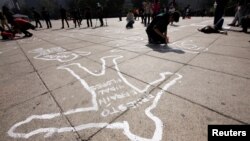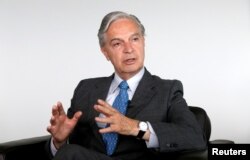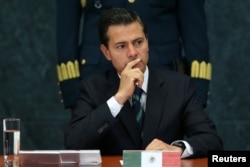Mexico must significantly improve police pay and conditions to end chronic drug gang violence plaguing the country, said a former foreign minister now running for the presidency.
Latin America's second-biggest economy is on course to register its highest murder tally this year since modern records began, with violence encroaching into areas relatively unaffected before, including the capital, Mexico City.
Presidential candidate Luis Ernesto Derbez, who was economy minister and then foreign minister in the 2000-2006 administration of Vicente Fox, said Mexico must crack down on rampant impunity and overhaul the police to turn the tide.
"My proposal is to pay them 25,000 pesos [$1,410] a month," he told Reuters in an interview late Wednesday, giving the figure as a minimum starting level for police. "A respectable police officer needs a respectable salary."
A government report from May 2016 showed average entry-level pay for a state police officer was 10,434 pesos ($588) a month, although some in poorer states earned as little as 5,350 pesos.
Derbez is a long shot to win the July 2018 contest, having stepped back from politics after holding office, and only recently announcing his intention to seek the candidacy of the opposition center-right National Action Party (PAN).
His proposal is likely to stir debate on how to end the bloodshed staining Mexico's reputation.
President Enrique Pena Nieto, a member of the Institutional Revolutionary Party (PRI), made pacifying the country his top priority when he took office in December 2012.
After making initial progress on cutting the death toll, Pena Nieto's government has been increasingly swamped by the violence. He is barred by law from seeking a second term.
Low confidence in police
Poor pay, alongside threats and bribes from criminal gangs, has aggravated corruption in the police force, undermining already weak confidence in law enforcement.
Arguably the biggest crisis of Pena Nieto's administration was sparked by the abduction and apparent massacre of 43 trainee teachers by police working with a drug gang in late 2014.
Derbez said that to provide more incentives for officers not to stray into criminality, their families should be granted access to better health care and education. Police should also be subject to regular, rigorous loyalty tests, he added.
Any police officers caught associating with criminals should face tougher penalties, going straight to prison and forfeiting all benefits for their families, he added.
Saying it would take about a decade, Derbez estimated his plan would cost an extra 300 billion pesos ($16.9 billion) annually and could be funded by cuts to welfare.
In dollar terms, the sum was equivalent to roughly 1.5 percent of Mexican gross domestic product in 2016.
The benefits would more than justify the expense, Derbez said, citing studies suggesting the total cost to Mexico of violence exceeds 10 percent of GDP.
He said the first priority was improving policing in the big cities, border towns and especially the main tourist areas.
The best place to start was the beach resort of Acapulco, where endemic violence has been "a stain on Mexico's image worldwide," he said.







